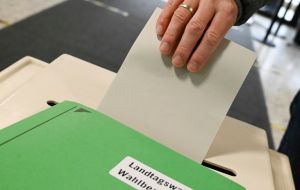MercoPress. South Atlantic News Agency
Defeat in regional elections tarnishing German chancellor Merkel exit from active politics
 CDU’s lackluster showing could mean Merkel’s preferred candidate to succeed her as chancellor, party leader Armin Laschet, won’t even get a chance to run.
CDU’s lackluster showing could mean Merkel’s preferred candidate to succeed her as chancellor, party leader Armin Laschet, won’t even get a chance to run.  The big winner was the Green Party, which held on to first place in Baden-Württemberg, and nearly doubled its result in Rhineland-Palatinate to finish third.
The big winner was the Green Party, which held on to first place in Baden-Württemberg, and nearly doubled its result in Rhineland-Palatinate to finish third. A collapse in support for Angela Merkel’s Christian Democrats in two regional elections on Sunday signaled that a widening corruption scandal and missteps during the pandemic may threaten the party’s hold on power in a national election this September.
The center-right party suffered its worst-ever results in both Baden-Württemberg, home to much of the country’s auto industry, as well as in Rhineland-Palatinate, a small western state bordering France where Helmut Kohl made his name.
The Christian Democratic Union (CDU), often described as Germany’s last remaining Volkspartei, or big-tent party, lost about 15 percent of its support compared to the previous election in 2016 in both states, a historic decline that party leaders made no effort to sugarcoat.
“One has to be honest about it, the CDU recorded a disastrous result,” said Susanne Eisenmann, the CDU’s lead candidate in Baden-Württemberg, of her loss.
As expected, the big winner of the night was the Green Party, which held on to first place in Baden-Württemberg, and nearly doubled its result in Rhineland-Palatinate to finish third.
The CDU’s lackluster showing could mean Merkel’s preferred candidate to succeed her as chancellor — new party leader Armin Laschet — won’t even get a chance to run.
Laschet, the premier of North Rhine-Westphalia, is vying with Markus Söder, leader of the CDU’s Bavarian sister party, the Christian Social Union (CSU), to be the conservative standard-bearer in the upcoming campaign. With Söder well ahead in the polls in terms of favorability, Laschet needed a big boost on Sunday that he didn’t get.
No matter who ends up running, the conservatives, who have led the federal government for 16 years under Merkel, face the biggest threat to their dominance in a generation. The government’s handling of the pandemic, widely praised in the initial phases of the crisis, has come under fire more recently amid frustration over continued restrictions and the slow pace of vaccinations.
The Christian Democrats have long been regarded in Germany as the party that knows how to run things. Yet during the pandemic, less and less has gone according to plan. From a government-sponsored tracing app introduced last year that didn’t work to a failure to quickly provide emergency aid for small firms, the conservatives have repeatedly fallen short. Most recently, the CDU-led government has struggled to make good on a promise to offer widespread COVID-19 tests for free.
“We’ve got a lot to sort through here,” acknowledged Michael Kretschmer, the CDU premier of Saxony, in an interview with German public television after the election results came in.
As damaging as the government’s handling of COVID-19 has been, the biggest blow in Sunday’s election appeared to come from the corruption scandal it faces.
Over the past week alone, three conservative MPs have resigned from their party or parliamentary positions amid accusations of graft. A fourth, Axel Fischer, a CDU MP from Baden-Württemberg, had his parliamentary immunity suspended amid a criminal investigation into whether he accepted bribes from Azerbaijan. He denies any wrongdoing.
None of the four cases appears to be connected, but two of them involve accusations that the MPs accepted commissions totaling hundreds of thousands of euros for helping to secure government contracts for mask manufacturers. One of the men, CSU MP Georg Nüßlein, served as a deputy leader of the conservatives’ parliamentary group until his resignation last week. He is under investigation for tax evasion and other crimes, accusations he denies.
Needless to say, whether criminal or not, the fact that conservative MPs profited from deals involving protective medical gear during the pandemic is not something that goes down well with voters.
The question is whether the party will manage to move beyond the affair before election day. That currently looks like a tall order.




Top Comments
Disclaimer & comment rulesCommenting for this story is now closed.
If you have a Facebook account, become a fan and comment on our Facebook Page!